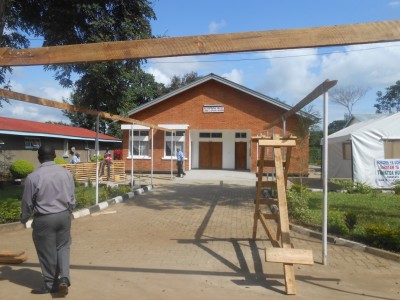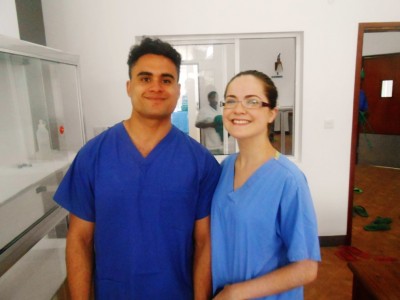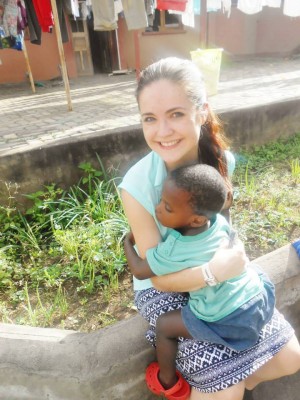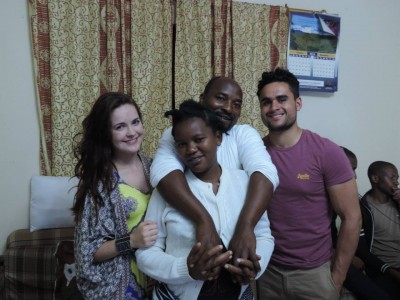My Hospital Internship in Tanzania
Published on Wednesday 19 October 2016My Hospital Internship in Tanzania
Emily Haines
My name is Emily Haines, and I have embarked on two unforgettable experiences in Africa. My life-long ambition is to become a doctor, and watching medical volunteers in Africa on BBC news TV channel one day motivated me to get in touch with Global Medical Projects to find out more. I was instantly hooked on the idea of embarking on an unforgettable lifetime experience in a Third world country! Although my trips took much planning in terms of finances and dates, it was certainly worthwhile. On my gap year prior to university, I took a month long trip for a medical and orphanage project in Ghana. Central Regional hospital in Cape Coast was where I spent the majority of my time, and it really opened up my eyes to the large differences between developing healthcare systems and the developed. Two years after reflecting on my time in Ghana, I could not wait to begin another project in another African setting, so I chose Tanzania. I was in Tanzania for 3 weeks, where I did another project, set in Meru District Hospital, and ‘Cradle of Love’ orphanage. People may think the two African projects I did were almost the same experiences, but I would definitely disagree. I came back from both experiences having learnt different practices, cultures and languages!
You can read about Emily’s medical and orphanage project in Ghana here.
 My 3 weeks in Tanzania was certainly another eye-opening experience, which I completed this summer before my final year of my Pharmacology degree. As the plane touched down in Kilimanjaro international airport, seeing the peak of Mount Kilimanjaro was absolutely breath-taking. By this point, I was eager to meet my host family. Arriving in Usa River, the children in the street were already greeting me and I knew I was going to settle in well. Pretty and Zablon, a couple who were hosting me made me feel at home right away, Zablon told me and the other volunteers about his sugar cane growing in the front garden, which was delicious! One thing different from Ghana was the cold shower and a hole in the ground for a toilet, which wasn’t such a bad thing as I may have expected. The food I was given by the lovely house maid, Neema, were in such generous portions, and I found myself eating a lot of rice, chicken and avocado! Chips mayai- a chip omelette was definitely a popular option with 4 of us volunteers staying in Zablon and Pretty’s house. Being called part of their family throughout the weeks was a great feeling and frequently watching the world cup with them during dinner time was always a good laugh! Sometimes we joined our host family and their friends in choir practice, I was overwhelmed by the amazing voices I heard, and it was great fun. Pretty also showed me and the other volunteers her and Zablon’s wedding photos and told us stories of how they met, I was very interested to hear about the culture of relationships in Tanzania.
My 3 weeks in Tanzania was certainly another eye-opening experience, which I completed this summer before my final year of my Pharmacology degree. As the plane touched down in Kilimanjaro international airport, seeing the peak of Mount Kilimanjaro was absolutely breath-taking. By this point, I was eager to meet my host family. Arriving in Usa River, the children in the street were already greeting me and I knew I was going to settle in well. Pretty and Zablon, a couple who were hosting me made me feel at home right away, Zablon told me and the other volunteers about his sugar cane growing in the front garden, which was delicious! One thing different from Ghana was the cold shower and a hole in the ground for a toilet, which wasn’t such a bad thing as I may have expected. The food I was given by the lovely house maid, Neema, were in such generous portions, and I found myself eating a lot of rice, chicken and avocado! Chips mayai- a chip omelette was definitely a popular option with 4 of us volunteers staying in Zablon and Pretty’s house. Being called part of their family throughout the weeks was a great feeling and frequently watching the world cup with them during dinner time was always a good laugh! Sometimes we joined our host family and their friends in choir practice, I was overwhelmed by the amazing voices I heard, and it was great fun. Pretty also showed me and the other volunteers her and Zablon’s wedding photos and told us stories of how they met, I was very interested to hear about the culture of relationships in Tanzania.
 For my medical placement in Meru District Hospital in Tengeru, I was told to catch the Dala Dala bus with the other volunteers, which was an interesting; sitting close to Tanzanians was a great way to meet the locals! A journey from Usa River to Meru hospital cost only about 300 Tanzanian shillings, this was about 10 pence, so very cheap. I had some expectations of what the hospital may be like since previously working in Ghana, but it was different in some ways. It was a lot smaller and underprivileged than Cape Coast hospital. There were also some problems I noticed such as dangers in transporting the female patients from the maternity ward to surgery for their Caesarean sections, but building a safe walkway was funded by an American charity. Throughout my medical project, I visited the male ward and encountered various conditions, with HIV/AIDS being the number one disease in terms of occurrence. From speaking to the nurses I picked up a lot of medical terms in the native language- Swahili. This helped me to understand medical notes to find out what patients had and what treatments they were on. The follow up of a malnourished, heart failure patient with a doctor and medical student is one that will stick in my mind- devising a treatment plan using our combined knowledge, really gave me a chance to learn some clinical skills with a patient-based approach. Another patient that stays with me was a victim of a motor cycle accident with major brain injury; his affected memory meant it was impossible to contact his family and he could not afford an MRI scan, which was a serious problem that we aimed to tackle. Using a clinical handbook and the BNF as a prescribing guide, me and the other volunteers formed a strong relationship with the doctors; they taught us the practice of medicine and we discussed best treatments for patients.
For my medical placement in Meru District Hospital in Tengeru, I was told to catch the Dala Dala bus with the other volunteers, which was an interesting; sitting close to Tanzanians was a great way to meet the locals! A journey from Usa River to Meru hospital cost only about 300 Tanzanian shillings, this was about 10 pence, so very cheap. I had some expectations of what the hospital may be like since previously working in Ghana, but it was different in some ways. It was a lot smaller and underprivileged than Cape Coast hospital. There were also some problems I noticed such as dangers in transporting the female patients from the maternity ward to surgery for their Caesarean sections, but building a safe walkway was funded by an American charity. Throughout my medical project, I visited the male ward and encountered various conditions, with HIV/AIDS being the number one disease in terms of occurrence. From speaking to the nurses I picked up a lot of medical terms in the native language- Swahili. This helped me to understand medical notes to find out what patients had and what treatments they were on. The follow up of a malnourished, heart failure patient with a doctor and medical student is one that will stick in my mind- devising a treatment plan using our combined knowledge, really gave me a chance to learn some clinical skills with a patient-based approach. Another patient that stays with me was a victim of a motor cycle accident with major brain injury; his affected memory meant it was impossible to contact his family and he could not afford an MRI scan, which was a serious problem that we aimed to tackle. Using a clinical handbook and the BNF as a prescribing guide, me and the other volunteers formed a strong relationship with the doctors; they taught us the practice of medicine and we discussed best treatments for patients.
Diabetes was a common ailment in the area; a diabetic clinic was held twice a week and I could see some issues related to patient compliance, on being leg amputations from necrosis as a result. I resorted to suggesting to the matron maybe creating some simple posters to educate patients regarding their condition. Observing the cervical screening procedure was intriguing, the methods employed by using acetic acid to detect cancer cells were as a result of limited resources. Seeing women getting diagnosed with a HIV rapid test was very sad and overwhelming for the patients, but the doctor’s approach was very empathetic and thorough in investigating reasons. Visiting major surgery was an exciting opportunity, I was lucky enough to observe a C- section, and the intricacy required to stitch the incision back up was amazing. I spent the majority of my time in minor surgery, what me and the other volunteers called ‘minor ops’. Here I had the chance to treat patient wounds, such as stitching and bandaging. I also carried out emergency treatments, fracture diagnoses and castings. Children were given ketamine as a general anaesthetic, showing some treatment limitations. The different causes of people’s wounds was nothing I had seen before, severe wounds from gang fights, dog bites and farming equipment were some I encountered. Working in the hospital pharmacy was a completely different experience to my summer part-time job as a dispenser in the UK. There was a shortage of staff so I had to give patients advice and their medications in the absence of the pharmacist. There was also lack of drugs which was a problem for patients as it delayed many of them receiving antibiotics from hospital acquired infections. However, despite the lack of resources, many of staff in Meru had a persistent, caring attitude with patients, which was very admirable. In my last week, I was lucky enough to learn about Meru and it being a government-run hospital. An anthropologist from the US spoke to me about funding for her project to improve the hospital infrastructure, which was a common issue there. This motivated me to donate some money to the project, to improve the safety of the hospital buildings. There are many experiences in the hospital I had that will be hard to forget, and I truly appreciate the willingness of the doctors in the hospital to teach a complete stranger like me. Applying my knowledge on different treatments in the hospital, I really felt I made a contribution to the healthcare, and because of the lack of drugs in the hospital, educating the nurses and doctors of ones they did not know of, I was giving something back to them, which was especially fulfilling.
 I always looked forward to volunteering at ‘Cradle of Love’ Orphanage every day from 2 til 5pm. I would catch a Dala Dala from Tengeru to Usa River, and walk 5 minutes to the orphanage. One thing I did not expect when I arrived was the security of the orphanage; there were iron gates with a security guard outside, which were certainly reassuring for the owner! Being introduced to the toddlers and babies was an exciting experience and I had never looked after children at such a young age! I was told some of the children in the orphanage were abandoned or some parents could not afford to keep their babies, the latter made me realise many of the parents put their children in Cradle for good reasons. Some children had HIV infection and one had rickets, but the dedicated attitude of the nannies provided the best care for them. Usually when I arrived the toddlers and ‘wobblers’ would have woken up from their afternoon naptime, when they were full of energy to say the least! The babies loved attention from all the volunteers there, and this made me feel I was making a difference. Playing in the garden was a favourite activity for the children; this was obvious from their immediate excitement when we got out the shoebox to put on their shoes! One thing I did find challenging whilst working in the orphanage was dividing my attention to the different children, and many wanted a turn on the swing-set at the same time. But there were other activities for the children to do, such as playing on the slides or with the toys inside the home. Once I had the chance to change a little boy’s nappy, which to be honest, I had never even done before! Throughout my time at the orphanage, I got to know the children’s personalities very well and so I knew what they did and didn’t like, which was essential to make their day a happy one. Seeing the children laughing from a small game of ‘chase’, I noticed even in a place with little resource the children could enjoy themselves. Dinnertime each day was very eventful. With the other volunteers, I would assemble the table and chairs for the toddlers to sit at a small table together. Some days if the children were in a mischievous mood they wouldn’t want to sit down but make me catch them first! This was initially difficult, but through learning each child’s preferences and from gaining their trust, it became a lot easier. The words ‘Jakula’ meaning ‘food’ in Swahili was always a trigger for their excitement! Being at Cradle of Love, I realised that giving some attention and loving communication to the children was definitely a way to brighten up both mine and their day.
I always looked forward to volunteering at ‘Cradle of Love’ Orphanage every day from 2 til 5pm. I would catch a Dala Dala from Tengeru to Usa River, and walk 5 minutes to the orphanage. One thing I did not expect when I arrived was the security of the orphanage; there were iron gates with a security guard outside, which were certainly reassuring for the owner! Being introduced to the toddlers and babies was an exciting experience and I had never looked after children at such a young age! I was told some of the children in the orphanage were abandoned or some parents could not afford to keep their babies, the latter made me realise many of the parents put their children in Cradle for good reasons. Some children had HIV infection and one had rickets, but the dedicated attitude of the nannies provided the best care for them. Usually when I arrived the toddlers and ‘wobblers’ would have woken up from their afternoon naptime, when they were full of energy to say the least! The babies loved attention from all the volunteers there, and this made me feel I was making a difference. Playing in the garden was a favourite activity for the children; this was obvious from their immediate excitement when we got out the shoebox to put on their shoes! One thing I did find challenging whilst working in the orphanage was dividing my attention to the different children, and many wanted a turn on the swing-set at the same time. But there were other activities for the children to do, such as playing on the slides or with the toys inside the home. Once I had the chance to change a little boy’s nappy, which to be honest, I had never even done before! Throughout my time at the orphanage, I got to know the children’s personalities very well and so I knew what they did and didn’t like, which was essential to make their day a happy one. Seeing the children laughing from a small game of ‘chase’, I noticed even in a place with little resource the children could enjoy themselves. Dinnertime each day was very eventful. With the other volunteers, I would assemble the table and chairs for the toddlers to sit at a small table together. Some days if the children were in a mischievous mood they wouldn’t want to sit down but make me catch them first! This was initially difficult, but through learning each child’s preferences and from gaining their trust, it became a lot easier. The words ‘Jakula’ meaning ‘food’ in Swahili was always a trigger for their excitement! Being at Cradle of Love, I realised that giving some attention and loving communication to the children was definitely a way to brighten up both mine and their day.
But again, my time in Tanzania was filled with many fun activities outside of working! Once a week, Joshua, our Tanzanian Volunteer coordinator gave me and other volunteers I lived near Swahili lessons, which was a great help in terms of constructing sentences to speak to the locals, and even the patients in the hospital. Learning some basic greetings such as ‘Habari’, ‘Shikamoo’ and ‘Jumbo’ were different ways to greet different ages of people. We were also taught the names of different foods such as Orange being ‘Chungwa’, making it a lot easier when buying food in the markets! I visited a few Safaris, which were a highlight of the trip! The first weekend I visited Arusha national park, where I managed to see a lot of monkeys and even giraffes in the distance! Previously hearing about safaris and seeing them were completely different; Tarangire and the Ngorongoro crater were so beautiful it felt surreal, and seeing the elephants, zebras and lions was my favourite part. At this time, from staying at a campsite in Africa, I got a real feel of the African night-time air. Visiting a snake farm, I learnt about a wide range of the different species and some, about their lethal abilities. I even held a snake for the first time. Moshi hot springs was very enjoyable for me, despite the bumpy journey to get there! Swinging off a rope to fall into the warm waters was exhilarating, and if I stayed still, I could feel the fish nibbling my feet, I couldn’t complain about a free pedicure! A regular activity was visiting the local bar in Usa River and making friends with some locals, after this a group of us volunteers and some locals went onto Via Via, a club in the central town of Arusha. A mix of western and African music created an amazing laidback atmosphere, and was the perfect chance to meet other volunteers from all over the world. I will never forget our driver, Peter, who gave me advice on where to go and took us volunteers to places at a discounted price compared to taxis, and despite a small language barrier between us, I considered him a close friend. My experiences in Tanzania were unforgettable, and not only did I feel myself develop as a person, but I made some life-long friends that I hope to see again one day. Staying with Zablon and Pretty were most definitely the best hosts you could ask for. I have a parting gift from them that reads ‘Karibu’, meaning ‘Welcome’ and I think of this as a symbol for them welcoming me back there some day. They taught me that people coming from two completely different parts of the world can be as close as a family.
 I definitely recommend taking a trip to Ghana or Tanzania, these were both life-changing experiences that really put aspects of life into perspective. I have definitely grown as a person as a result of these trips, and I will forever cherish my memories and the many things I have learnt. I chose Global Medical Projects because they really do care about you making the most of your experiences. Throughout my stays in Ghana and Tanzania I felt a great sense of security with Global Medical Projects, despite being in a foreign area. I’d like to thank Kevin Dynan for giving me so much advice prior to my journeys and for making the application process a smooth one. I also thank Eric and Mary Essuah, who were fantastic in ensuring my stay in Ghana was safe, organised and enjoyable. Zablon and Pretty Mgonja were two amazing people who made sure I made the most of my stay Tanzania, which I am very grateful for.
I definitely recommend taking a trip to Ghana or Tanzania, these were both life-changing experiences that really put aspects of life into perspective. I have definitely grown as a person as a result of these trips, and I will forever cherish my memories and the many things I have learnt. I chose Global Medical Projects because they really do care about you making the most of your experiences. Throughout my stays in Ghana and Tanzania I felt a great sense of security with Global Medical Projects, despite being in a foreign area. I’d like to thank Kevin Dynan for giving me so much advice prior to my journeys and for making the application process a smooth one. I also thank Eric and Mary Essuah, who were fantastic in ensuring my stay in Ghana was safe, organised and enjoyable. Zablon and Pretty Mgonja were two amazing people who made sure I made the most of my stay Tanzania, which I am very grateful for.
Many people combine time at the hospital with time at the orphanage and this combination often works well. Combined placements are only £100 – $160 – €120 extra to cover the additional donation to the orphanage.
To follow in Emily’s footsteps read more about the medical project in Tanzania.
You can also read more about our orphanage placements in Tanzania.
